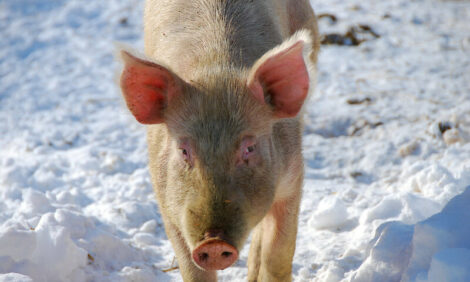



What Are We Eating?
So you only eat free-range eggs, and spend the extra on organic sausages. But what's life really like for the animals that end up on your plate? And how can you be sure that the meat in your shopping bag is cruelty-free, asks Rob Sharp.
Many a poultry farmer will tell you that "a battery chicken's a happy chicken", a view based on their not altogether erroneous view that relatively unintelligent birds are well suited to intensive conditions.
The same argument can most definitely not be applied to pigs, though. As the most intelligent British farm animal, the porker is also the most abused, in order to satisfy our demand for cheap bacon.
"If we think of it in human terms, in the terms of intelligence that we value, pigs do have high levels of intelligence," says Julia Wrathall, head of the RSPCA Science Group's farm animals department. "They out-do dogs in many intelligence tests. To realise that a pig can be just as clever in the same way that dogs are is a very interesting thing."
She points out that it is normal for pigs, which are outdoor creatures, to spend a lot of time foraging in the wild. Many intensively reared pigs, however, spend their entire lives under cover. "If people do care about animals, they should think about things from the animal's perspective," Wrathall says.
One of the biggest bêtes noires of the animal-welfare lobby is the use of "sow stalls," a system by which female pigs spend most of their four-month pregnancies caged in narrow stalls or chained in rows by heavy tethers. In 1999, the UK banned this system, and the EU has agreed to do the same starting in 2013. However, last month it was reported that Co-op, Morrisons, Sainsbury's and Somerfield were (perfectly legally) importing stall-produced meat from abroad and selling it under their own labels.
Meanwhile, at the end of their pregnancies, most breeding sows still give birth and nurse their piglets in small metal cages called farrowing crates. The pressure group Compassion in World Farming is campaigning for all supermarkets to end the use of these crates.
The only real way to guarantee that you get ethical pork and bacon is to buy free range – the lucky pigs you see snuffling round fields or orchards full of sties made from semi-circular corrugated iron. Most butchers will clearly label such meat. It is also readily available in some supermarkets: one-third of the own-label pigmeat sold by Co-op and M&S is free range, and all of it sold by Waitrose is produced outdoors. According to CIWF, Asda and Waitrose are the only supermarkets to ensure that sows are provided with straw.
Farmers, meanwhile, argue that ethical consumers should buy British. Danish bacon, a longstanding housewives' favourite, is said to be a pig welfare disaster. "I can say hand on heart that we have the best welfare pigs in the world," says Barney Kay of the National Pig Association. "One big difference between the UK and meats imported is that all ours stay entire, whereas on the Continent they are castrated."
Source: The Independent
The same argument can most definitely not be applied to pigs, though. As the most intelligent British farm animal, the porker is also the most abused, in order to satisfy our demand for cheap bacon.
"If we think of it in human terms, in the terms of intelligence that we value, pigs do have high levels of intelligence," says Julia Wrathall, head of the RSPCA Science Group's farm animals department. "They out-do dogs in many intelligence tests. To realise that a pig can be just as clever in the same way that dogs are is a very interesting thing."
She points out that it is normal for pigs, which are outdoor creatures, to spend a lot of time foraging in the wild. Many intensively reared pigs, however, spend their entire lives under cover. "If people do care about animals, they should think about things from the animal's perspective," Wrathall says.
One of the biggest bêtes noires of the animal-welfare lobby is the use of "sow stalls," a system by which female pigs spend most of their four-month pregnancies caged in narrow stalls or chained in rows by heavy tethers. In 1999, the UK banned this system, and the EU has agreed to do the same starting in 2013. However, last month it was reported that Co-op, Morrisons, Sainsbury's and Somerfield were (perfectly legally) importing stall-produced meat from abroad and selling it under their own labels.
Meanwhile, at the end of their pregnancies, most breeding sows still give birth and nurse their piglets in small metal cages called farrowing crates. The pressure group Compassion in World Farming is campaigning for all supermarkets to end the use of these crates.
The only real way to guarantee that you get ethical pork and bacon is to buy free range – the lucky pigs you see snuffling round fields or orchards full of sties made from semi-circular corrugated iron. Most butchers will clearly label such meat. It is also readily available in some supermarkets: one-third of the own-label pigmeat sold by Co-op and M&S is free range, and all of it sold by Waitrose is produced outdoors. According to CIWF, Asda and Waitrose are the only supermarkets to ensure that sows are provided with straw.
Farmers, meanwhile, argue that ethical consumers should buy British. Danish bacon, a longstanding housewives' favourite, is said to be a pig welfare disaster. "I can say hand on heart that we have the best welfare pigs in the world," says Barney Kay of the National Pig Association. "One big difference between the UK and meats imported is that all ours stay entire, whereas on the Continent they are castrated."
Source: The Independent








